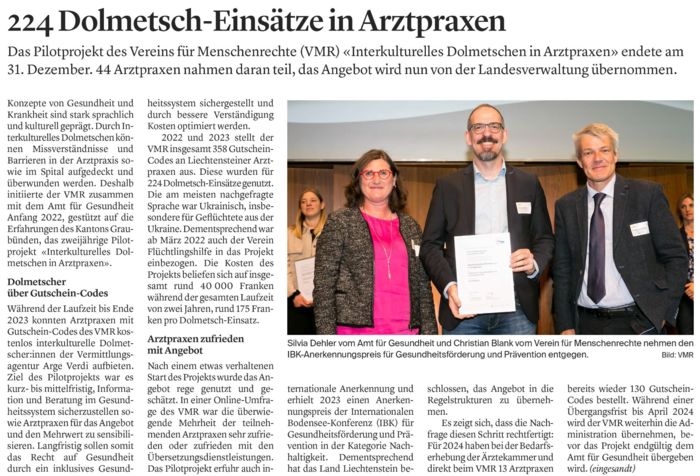Interpreting services for foreign language speakers
Non-discriminatory access to healthcare services is a central human rights concern. To this end, there are also obligations to provide information for foreign-language speakers. Fulfilling this can be a major challenge in practice. Apart from language barriers, the concepts of health and illness as well as ideas of curative therapies are also culturally different. Intercultural interpreters can help to break down these barriers. They help to culturally classify symptoms, findings, treatment methods or health-related recommendations. This promotes acceptance of a treatment recommendation and its correct implementation and contributes to the success of the treatment.
Following the conclusion of a two-year pilot project "Intercultural interpreting in medical practices in Liechtenstein", which provided and financed interpreters for medical consultations, this service was incorporated into the range of services offered by the Office of Public Health for an unlimited period in April. Although the service had to be temporarily suspended between mid-June and October for financial reasons, it was subsequently resumed.
The VMR prepared a final report with an evaluation of the pilot project for the project partners and the government. In it, it made six recommendations. The first recommendation was implemented in the reporting year with the takeover of the service by the Principality of Liechtenstein. It also recommends the use of interpreting services in psychotherapy and physiotherapy as well as the expansion to other areas of society (e.g. education, social affairs). In the medium term, the funding and use of interpreting services should be harmonized throughout the entire administration, their impact measured in the long term and the services made widely known.
Some measures have already been implemented. For example, the standardized communication tool "Klapp" has been introduced in Liechtenstein schools, which can be used to communicate between teachers and the education authority as well as parents or guardians. Thanks to automatic translation into various languages, it simplifies communication and mutual understanding between foreign-language families in particular. In addition, interpreters are now available for meetings with parents. Finally, an interdepartmental working group has been set up to standardize interpreting services in the state administration.
Extend the range of interpreting services in doctors' surgeries to all healthcare services and other areas of society. Standardize funding and make the service better known.

